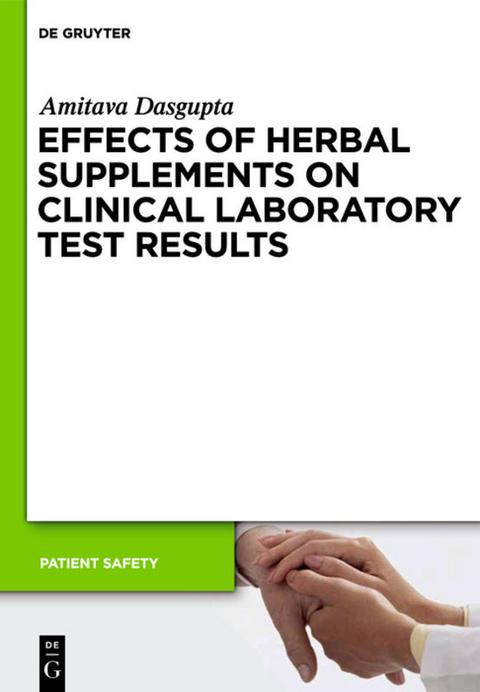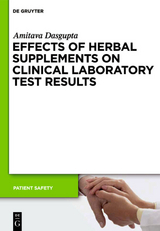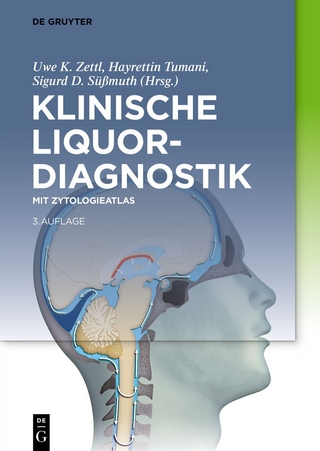Effects of Herbal Supplements on Clinical Laboratory Test Results
Seiten
New Series: Patient Safety Medical errors do not only occur in the laboratory, but pose a direct threat to patient safety. The clinical laboratory is an integral part of care, and the results of analytics are an essential component of informed decision-making for clinicians. Efforts to avoid laboratory errors, especially minimizing pre- and postanalytical errors, are in the responsibility of laboratory professionals.The new handbook series with the international known editors Oswald Sonntag and Mario Plebani fills a vacancy in the relevant and promising area of patient safety and quality assurance.
Herbal supplements are available without prescription in many countries throughout the world and accounting for over $30 billion U.S dollar in sale. A majority of U.S population (25-40%) use herbal supplements while alternative medicines are major forms of therapy in third world countries used by as much as 80% population. Contrary to the popular belief that herbal remedies are safe and effective, many herbal supplements have known toxicity and unexpected laboratory test results may be the early indications of such toxicity. In addition, some herbal products such as St. John’s wort can interact with many Western drugs causing increased clearance of such drugs and hence treatment failure. This monograph would provide information on how herbal supplements affect laboratory test results thus patient’s safety. This monograph would provide a comprehensive and concise practical guide for laboratory professionals, physicians and other health care professionals. The emphasis of this monograph is to provide clinically relevant information rather than discussing in detail mechanisms of such effect, although brief explanations would be provided for such unexpected test results.
Herbal supplements are available without prescription in many countries throughout the world and accounting for over $30 billion U.S dollar in sale. A majority of U.S population (25-40%) use herbal supplements while alternative medicines are major forms of therapy in third world countries used by as much as 80% population. Contrary to the popular belief that herbal remedies are safe and effective, many herbal supplements have known toxicity and unexpected laboratory test results may be the early indications of such toxicity. In addition, some herbal products such as St. John’s wort can interact with many Western drugs causing increased clearance of such drugs and hence treatment failure. This monograph would provide information on how herbal supplements affect laboratory test results thus patient’s safety. This monograph would provide a comprehensive and concise practical guide for laboratory professionals, physicians and other health care professionals. The emphasis of this monograph is to provide clinically relevant information rather than discussing in detail mechanisms of such effect, although brief explanations would be provided for such unexpected test results.
Amitava Dasgupta, University of Texas Medical School, Houston, USA.
lt;p>1. Commonly used herbal supplements
2. Abnormal liver function tests due to use of herbal supplements.
3. Kelp and thyroid panel
4. Interferences in digoxin immunoassays by various herbal supplements
5. Interaction of St. John's wort with various drugs
6. Which herbs to avoid with warfarin therapy?
7. Interaction of ginseng, ginkgo, garlic and ginger supplements with various drugs
8. Interaction of various fruit juices with drugs
9. Heavy metal toxicity due to use of oriental and Ayurvedic medicines
10. Unexpected laboratory test results due to contamination of herbal supplements with Western drugs
11. Moderately toxic and dangerous herbs
| Erscheint lt. Verlag | 17.5.2011 |
|---|---|
| Reihe/Serie | Patient Safety ; 2 |
| Zusatzinfo | 4 b/w and 6 col. ill., 25 b/w tbl. |
| Verlagsort | Berlin/Boston |
| Sprache | englisch |
| Maße | 170 x 240 mm |
| Gewicht | 255 g |
| Themenwelt | Medizin / Pharmazie ► Allgemeines / Lexika |
| Medizin / Pharmazie ► Medizinische Fachgebiete ► Laboratoriumsmedizin | |
| Schlagworte | Arzneimittel • Drugs • Drugs; Herbage; Laboratory Medicine; Interaction; Herbal Drugs • Heilkräuter • Herbage • herbal drugs • interaction • Kräuter • laboratory medicine • Labormedizin • Patienten • Patientensicherheit • Pflanzliche Drogen • Wechselwirkungen |
| ISBN-10 | 3-11-024561-2 / 3110245612 |
| ISBN-13 | 978-3-11-024561-5 / 9783110245615 |
| Zustand | Neuware |
| Informationen gemäß Produktsicherheitsverordnung (GPSR) | |
| Haben Sie eine Frage zum Produkt? |
Mehr entdecken
aus dem Bereich
aus dem Bereich
mit Zytologieatlas
Buch | Hardcover (2025)
De Gruyter (Verlag)
CHF 244,90
Buch | Softcover (2021)
Deutscher Ärzteverlag
CHF 41,95
ein praxisorientiertes Handbuch
Buch | Hardcover (2023)
Wiley-VCH Verlag GmbH
CHF 69,85




